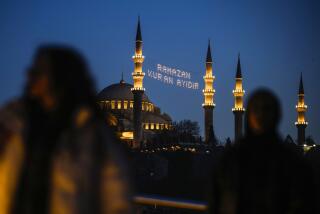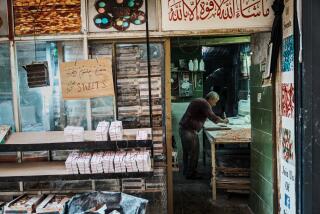Glory days are over at Iraq copper market
- Share via
BAGHDAD — For hundreds of years, the Safafeer copper market has been considered hallowed ground. Countless generations of fathers and sons have banged copper sheets into pots, plates and lamps in this narrow pedestrian side street, now home to more fabric shops than coppersmiths.
Those left say it is only a matter of time until their dozen or so dimly lighted stalls -- replete with chisels, hammers, nails, rusty metal cutters and grimy walls -- disappear. The artisans sit on their stools or stand barefoot on cardboard as they pound away at pieces of metal, knowing their profession is doomed, their sloped yellow-brick alleyway now belonging to them in name only.
The decline mirrors that of Iraq, buffeted by wars, sanctions, isolation and the drying up of tourism. Another major blow has been the introduction of cheap imported factory-produced copper goods.
Sayid Zuair Abu Haidar, 43, grew up at the market; his first memories are of visits on summer breaks from school. Now he disparages the trade and mocks any delusions of grandeur that its aging men and few teenage recruits might possess.
“There is no Picasso here,” he says in a space erected atop his family’s original shop in 1963.
He remembers how foreigners would buy souvenirs at a market famous for its pointy oil lamps and plaques decorated with the elegant, looping calligraphy of the Koran. “Anything you put in the store would be sold,” he said of those days from his childhood.
And government offices used to send in special orders for gifts.
Back then, the market stayed open at night; now it is shuttered by early afternoon. But now, few people, Iraqi or foreign, come to buy.
When he was a teenager, he hollowed out his first copperware, but was soon called up to the front of the Iran-Iraq war. When he left the army and returned to Baghdad six years later in 1992, he settled into the family trade, again taking his seat and hammering away at the copper sheets. By then, the market had begun its gradual fall.
“I keep working as a coppersmith because I don’t know what else to do. Because of the bad business, most coppersmiths here sold their stores,” Abu Haidar said.
He scoffs at news of the latest government initiative to preserve the street. Municipality representatives told him that they were going to restrict the long alley to coppersmiths. But he says the time has already passed: The great coppersmiths have died, or quit, and their relatives have shunned the trade, filling their stalls with hardware and fabric.
“Are they going to bring the coppersmiths back from the graves? Most of them are dead. Their sons are not real coppersmiths. Most have started to work as cab drivers and civil servants.”
The most famous coppersmith Abu Haidar knew growing up was Haj Hassan Abu Terab, who lived into his 90s. His admirers printed his portrait on matchboxes. Saddam Hussein even visited his store once.
But not a trace of Abu Terab is left. His sons sold his shop long ago. And now the market is flooded with factory-produced copper plates and pots from Iran, China and India, another nail in the coffin for its denizens. The pieces that take Abu Haidar two days to chisel and pound out, factories spit out by the thousands per hour.
“Few people respect the handmade pieces,” he said. “They just want something shiny.”
Abu Haidar doesn’t want his own son to spend his life toiling away at the market. “I want my son to be a doctor or engineer,” he said.
Despite the ominous signs, some of the next generation have joined the trade.
At 18, Ameer Saffeer says the market is in his blood and brags that his family has been here for 250 years.
Even he doesn’t expect the market to last. He remembers when there were 60 to 70 coppersmiths left; now there are only 20. Six of his relatives have sold their shops.
Saffeer wishes that the foreign tourists would come again, but then he looks around the market and is embarrassed by the puddles of sewer water and strewn garbage. He figures that tourists would laugh.
He would like to see the copper market moved to Baghdad’s Green Zone or the airport, to a spot that is cleaner and modern. At night, Saffeer moonlights in his uncle’s restaurant because he needs the money.
“Sometimes I tell my father, ‘I regret that I ever learned this job,’ ” he said, surrounded by the shiny oil lamps and candleholders he had made.
--
Times staff writer Ned Parker contributed to this report.
More to Read
Sign up for Essential California
The most important California stories and recommendations in your inbox every morning.
You may occasionally receive promotional content from the Los Angeles Times.













